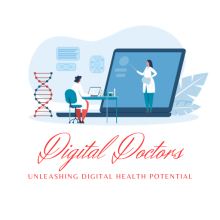Inspirational journeys
Follow the stories of academics and their research expeditions
Online Medical Course Developer: A Complete Guide to Launching and Excelling in Remote Healthcare Education

Introduction
The healthcare industry is undergoing a massive digital transformation, with online medical education playing a critical role in training professionals and educating patients. Online Medical Course Developers create digital learning content for universities, healthcare institutions, and e-learning platforms, ensuring that medical knowledge is accessible, engaging, and up-to-date. Their role involves designing curricula, developing instructional materials, integrating multimedia resources, and leveraging the latest e-learning technologies to deliver high-quality medical education. They work closely with subject matter experts, instructional designers, and IT specialists to create interactive and immersive learning experiences. Additionally, they stay updated with advancements in medical science and digital education trends to ensure that courses remain relevant and effective in a rapidly evolving healthcare landscape.
With the rise of remote learning, this career path offers flexibility, high earning potential, and the opportunity to make a real impact in global healthcare education. Whether you’re a medical professional, instructional designer, or entrepreneur, this guide will help you navigate the career path of an Online Medical Course Developer.
Minimum Qualifications and Skills Required
While specific requirements vary depending on the employer, here are the essential qualifications and skills for this role:
Minimum Educational Qualifications:
-
Bachelor’s or Master’s degree in Medicine, Nursing, Pharmacy, Biomedical Science, Public Health, Health Informatics, or a related field.
-
Degrees in Instructional Design, Educational Technology, or E-Learning Development can also be an advantage.
-
Professional certifications in Medical Education, Online Learning, or Health Technology are highly valued.
Licenses and Certifications:
-
Certified Professional in Healthcare Quality (CPHQ)
-
Certified Health Education Specialist (CHES)
-
Certified Instructional Designer (CID)
-
Online Learning Consortium (OLC) Certifications
-
Certified Medical Educator (CME)
Technical and Professional Skills:
-
E-learning platforms: Moodle, Blackboard, Canvas, Coursera, Teachable, Udemy
-
Multimedia tools: Articulate Storyline, Adobe Captivate, Camtasia, Vyond, Canva
-
Medical Writing & Research: Understanding of medical terminology and ability to translate complex concepts into layman-friendly content
-
Coding & Web Development (Optional): HTML, CSS, JavaScript for interactive content
-
Healthcare Compliance & Regulations: HIPAA, GDPR, and data security in online medical education
-
Communication & Collaboration: Ability to work with subject matter experts, instructional designers, and healthcare professionals
Salary Expectations for Online Medical Course Developers
Salaries vary based on experience, qualifications, and employer. Below are approximate annual salary ranges:
-
Entry-Level: $50,000 – $75,000
-
Mid-Level: $75,000 – $100,000
-
Senior-Level / Experts: $100,000 – $150,000+
-
Freelance / Contract-Based: $30 – $100 per hour
Freelancers and entrepreneurs can earn significantly higher, depending on the demand and pricing strategy.
Actively Hiring Companies, Startups, Organizations, and NGOs
Many organizations are actively hiring Online Medical Course Developers, including:
Healthcare & Medical Education Companies:
-
Coursera (www.coursera.org)
-
Udemy (www.udemy.com)
-
Elsevier (www.elsevier.com)
-
Wolters Kluwer Health (www.wolterskluwer.com)
-
MedBridge (www.medbridgeeducation.com)
Universities & Research Institutions:
-
Johns Hopkins University (www.jhu.edu)
-
Harvard Medical School Online (onlinelearning.hms.harvard.edu)
-
Stanford Medicine (med.stanford.edu)
E-learning Platforms & Health Startups:
-
Osmosis (www.osmosis.org)
-
Lecturio (www.lecturio.com)
-
Khan Academy Health & Medicine (www.khanacademy.org)
Remote-Friendly Job Boards & Recruitment Agencies:
-
FlexJobs (www.flexjobs.com)
-
We Work Remotely (www.weworkremotely.com)
-
LinkedIn Jobs (www.linkedin.com/jobs)
-
Remote.co (www.remote.co)
How to Apply for Remote Medical Course Developer Jobs
Where to Apply:
-
Company Career Pages: Check healthcare companies, e-learning platforms, and universities.
-
Job Boards: Utilize platforms like FlexJobs, Indeed, and LinkedIn Jobs.
-
Freelancing Platforms: Join Upwork, Fiverr, and Freelancer for contract-based work.
-
Networking & LinkedIn Optimization: Engage in professional groups, post industry insights, and showcase your portfolio.
How to Tailor Your LinkedIn Profile & Resume:
-
Optimize Your Headline: “Online Medical Course Developer | Digital Health Educator | E-Learning Specialist”
-
Showcase Your Skills: List software tools, instructional design, and healthcare knowledge.
-
Feature Work Samples: Upload demo courses, videos, and interactive learning content.
-
Engage with Industry Leaders: Comment on posts, join relevant groups, and connect with professionals.
Entrepreneurship, Innovation & Self-Employment Strategies
Starting Your Own Medical E-Learning Business
-
Identify Your Niche: Focus on patient education, medical certifications, or healthcare professional training.
-
Choose a Platform: Create a website with Teachable, Thinkific, or Kajabi.
-
Monetization: Offer subscription plans, certifications, and corporate training.
-
Marketing & Growth: Leverage SEO, YouTube, LinkedIn, and Facebook Ads to attract learners.
Freelance Opportunities & Side Hustles
-
Freelance Content Creation: Offer services on Upwork, Fiverr, and Toptal.
-
Medical Blogging & YouTube: Start a blog or YouTube channel for passive income.
-
E-book & Course Publishing: Sell educational content on Amazon Kindle or Gumroad.
Conclusion
Becoming an Online Medical Course Developer is an exciting and rewarding career path. Whether you choose remote employment, freelancing, or entrepreneurship, the demand for digital medical education is growing rapidly. By leveraging your healthcare expertise, instructional design skills, and online networking, you can establish yourself as a leader in this field.
Start your journey today by updating your LinkedIn profile, applying for remote jobs, or launching your own e-learning platform!
Tags:
Online Medical Course Developer Remote Healthcare Education Digital Health Careers Medical E-Learning Telemedicine Training Healthcare Instructional Design Medical Content Creator Online Learning Jobs Medical Course Development0 Comments
Categories
- Career Development and Opportunities in Digital Health 166
- White Papers 39
- IELTS For Medical Professional 35
- OET Exam Preparation 30
- Entrepreneurship and Innovation 26
- Healthcare Innovation 17





Leave a comment